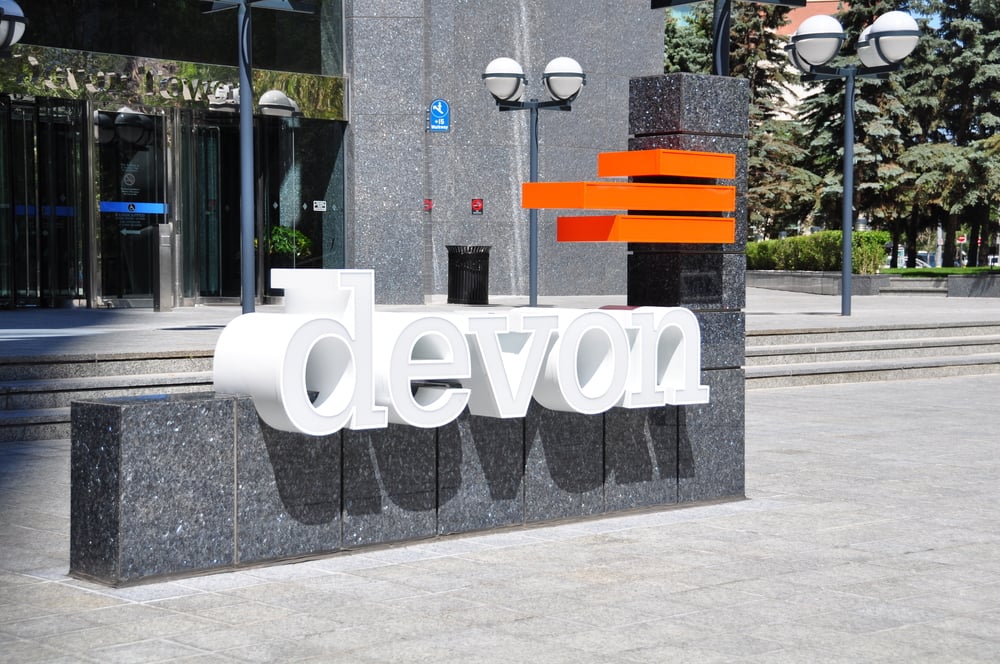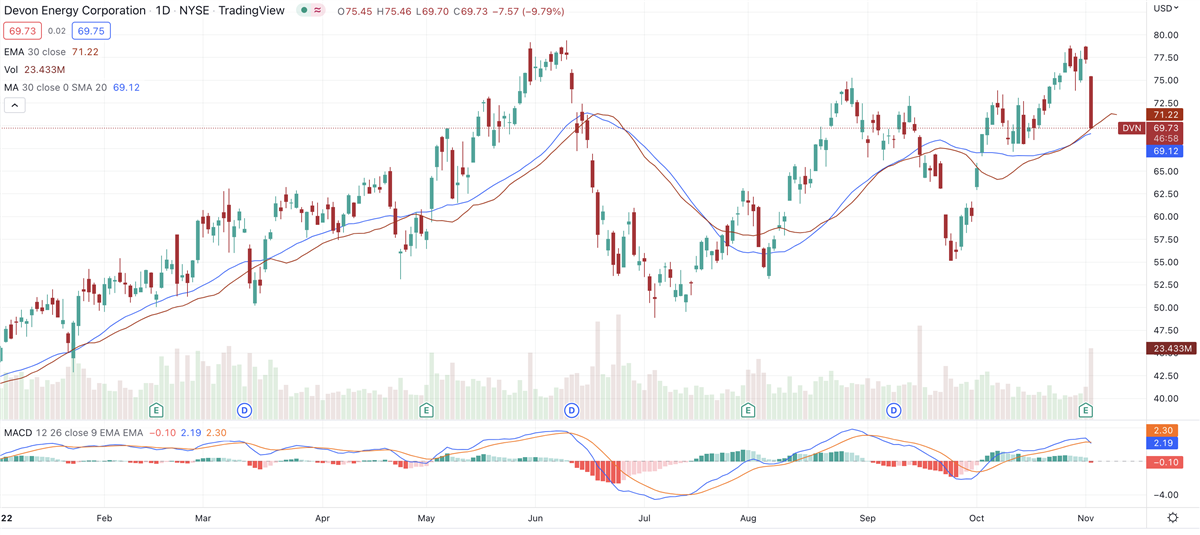Devon Energy Lower After Beating Q3 Views But Slashing Dividend Oil-and-gas explorer Devon Energy was trading lower Wednesday after Q3 results that beat views, but investors gave a thumbs down to a 13% dividend cut.
By Kate Stalter
This story originally appeared on MarketBeat

Oil-and-gas explorer Devon Energy (NYSE: DVN) was trading lower Wednesday after reporting third-quarter results after Tuesday's closing bell.
The Oklahoma-based company beat top- and bottom-line views, but investors gave a thumbs down to Devon's plan to slash its dividend by 13%.
Earnings came in at $2.18 per share, 102% higher than the year-ago quarter. Revenue was $5.43 billion, a gain of 57%.
While those were clearly strong results, the increases marked a slowdown from the red-hot pace of growth in the prior six quarters. Revenue is also growing at a slower pace than in 2021 or earlier this year.
MarketBeat earnings data for Devon show the company beating bottom-line views in the past six quarters, although revenue came in lower-than-expected on some occasions.
In Tuesday's earnings release, CEO Rick Muncrief highlighted operational efficiency over growth. While efficiency and cost containment are certainly key tenets of good management and can help boost earnings, it's not encouraging to investors looking for strong revenue growth.
Efficiency & Consistent Execution
"Devon's third-quarter performance demonstrated the flexibility of our cash-return business model to create value for shareholders in multiple ways," he said in a statement. "Foundational to our success was the team's consistent execution of our disciplined plan. This was once again demonstrated by strong well productivity and efficiency gains that drove volumes above the high end of guidance with a capital spend that was below forecast."
However, during the third quarter, the company closed on acquisitions in the Williston Basin and Eagle Ford for $2.5 billion. In the earnings release, the company said, "After funding these acquisitions with cash, Devon exited September with cash balances of $1.3 billion and strong investment-grade credit ratings."
Muncrief also addressed those acquisitions in his comments, saying, "As a result of the immediate value these acquisitions create, we are revising our financial and operational outlook higher for the fourth quarter. This updated outlook increases production targets, raises free cash flow projections and enhances our ability to deliver differentiated cash returns to shareholders."
Devon is revising its production forecast higher in the current quarter, to a range of 640,000 to 660,000 barrels of oil equivalent, or BOE, per day.
BOE is an oil-and-gas industry way of measuring quantities of both natural gas and crude oil.
This new forecast marks a 6% increase over the year-ago quarter. The company said it would be driven by 35,000 Boe per day of incremental production from the Eagle Ford acquisition.
Quarter-Over-Quarter Dividend Cut
As optimistic as that sounds, the dividend cut did not go over well. The company said its third-quarter dividend would be $1.35 per share, up from the year-ago quarter, but down sequentially.
The majority of Devon's operations are concentrated in the Permian Basin in West Texas. In addition to the recent Eagle Ford and Williston Bason acquisitions, the company operates in Oklahoma's Anadarko Basin and Wyoming's Powder River Basin.
With a market capitalization of $47.43 billion, Devon is a component of the S&P 500 energy sector. Within the sub-industry of domestic explorers and producers, only EOG Resources (NYSE: EOG) and Pioneer Natural Resources (NYSE: PXD) are larger. All three are part of the S&P 500 sector, but all are dwarfed by the integrated energy giants Exxon Mobil (NYSE: XOM) and Chevron (NYSE: CVX).
Among large-cap U.S.-based explorers and producers, Devon is the price-performance leader, with the following recent returns:
- 1 month: +28.55%
- 3 months: +28.07%
- Year-to-date: +84.15%
- One year: +95.19%
Smaller industry peers, including Amplify Energy (NYSE: AMPY), W&T Offshore (NYSE: WTI), Comstock Resources (NYSE: CRI), Talos Energy (NYSE: TALO), and Matador Resources (NYSE: MTDR) all have slightly better price performance. You'll often find small industry players notch the best gains, but the trade-offs can include higher risk and lower liquidity, in some cases.
Heading into Wednesday's close, Devon shares were around 7% below a cup-with-handle buy point of $75.37. The stock was finding solid support along its 50-day moving average, an indication that institutional investors may be taking partial profits, rather than selling off wholesale.








